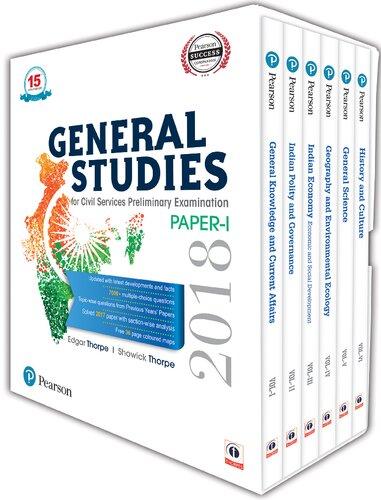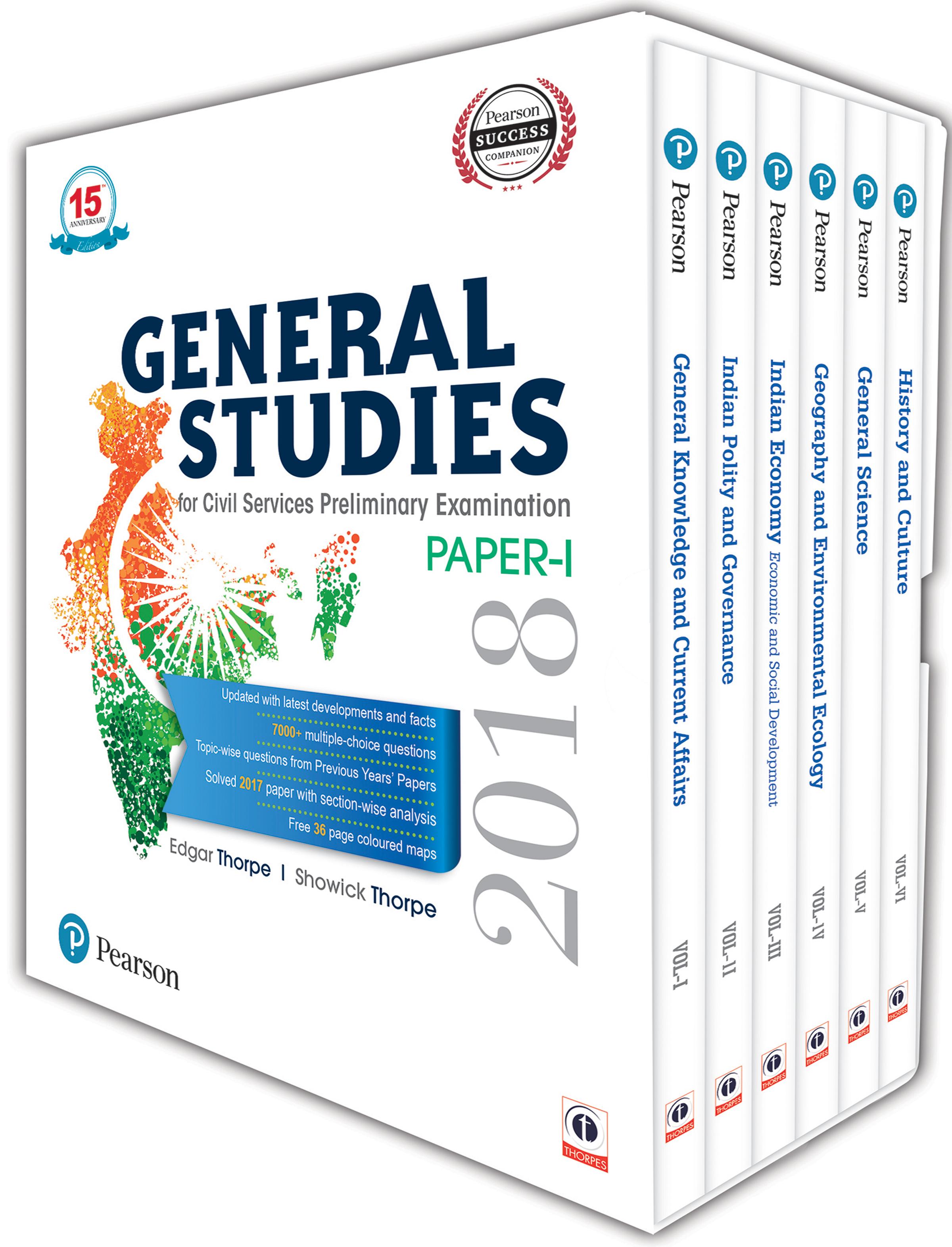Preliminary Examination 2018 6 Volume Set - eBook PDF
Visit to download the full and correct content document: https://ebooksecure.com/download/general-studies-for-civil-services-preliminary-exa mination-2018-6-volume-set-ebook-pdf/


About Pearson
Pearson is the world’s learning company, with presence across 70 countries worldwide. Our unique insights and world-class expertise comes from a long history of working closely with renowned teachers, authors and thought leaders, as a result of which, we have emerged as the preferred choice for millions of teachers and learners across the world.
We believe learning opens up opportunities, creates fulfilling careers and hence better lives. We hence collaborate with the best of minds to deliver you class-leading products, spread across the Higher Education and K12 spectrum.
Superior learning experience and improved outcomes are at the heart of everything we do. This product is the result of one such effort.
Your feedback plays a critical role in the evolution of our products and you can contact us – reachus@pearson.com. We look forward to it.
The writing style of the chapters is simple and very approachable. The marginalia boxes are illuminating and make the reading quite interesting.
Srirangam Sri Ram Sriram’s IAS, Delhi
Succinct, stimulating and self-instructional book with a learner friendly orientation.
Mukul Pathak
Vajiram and Ravi, Delhi
A learner-friendly, self-instructional and stimulating compendium for easy understanding and effective application of basic concepts to mark edge over others.
S.K. Manocha
Vajiram and Ravi, Delhi
The book scores a point with its detailed structure and ability to strengthen the basics of aspirants preparing for the General Studies Paper of the UPSC Civil Services (Preliminary) Examination. The text is easy to read and understand.
P. M. Tripathi
Vaid’s ICS, Lucknow
The one-stop solution approach adopted by the book would certainly be a time saver for all civil services and PCS candidates. The sections on History, Polity, Science and General Awareness are particularly appreciable.
Soubhik Sen STEPS IAS, Delhi
It is very useful, beneficial and relevant for IAS/PCS preliminary examinations.
Dharmendra Kumar Dharmendra’s Sociology, Delhi
All the sections of this book are excellent for UPSC aspirants.
Nawab Singh Somvanshi Nishkarsh IAS, Delhi
While going through the Pearson’s General Studies, I found that it is useful for all Civil Services and PCS candidates.
Rahees Singh Academicians IAS, Lucknow
Fax: 080-30461003, Phone: 080-30461060
www.pearson.co.in, Email: companysecretary.india@pearson.com
GENERAL STuDIES
Paper-I For Civil Services Preliminary Examination
Showick Thorpe
Edgar ThorpeAbout the exAminAtion
The Civil Services Examination consists of two successive stages:
Civil Services Preliminary Examination (objective type) for the selection/screening of candidates for the next level of the examination, i.e., the main examination; and
Civil Services Main Examination (subjective type and interview) for the selection of candidates for the various services and post.
In 2011, UPSC introduced a new format for the preliminary examination, also known as CSAT (Civil Services Aptitude Test) that included two papers on General Studies: General Studies (Paper-I), and General Studies (Paper-II).
In 2013, there was a strategic shift in the format of the Civil Services Main Examination. The Civil Services Main Examination now has four compulsory papers of General Studies. There is only one optional subject now instead of two, plus there is one compulsory essay paper. English and one language paper are included in the Main Examination and declared as qualifying in nature.
In 2013, the UPSC also included the Indian Forest Service (IFS) in its civil services recruitment and hence, IFS aspirants are now required to take the Civil Services Preliminary Examination. Those IFS aspirants who may eventually clear the preliminary examination have to appear for the Main Examination.
Since 2015, the UPSC has made the CSAT (General Studies Paper-II) as qualifying in nature and one needs to score 33% to qualify. Marks of only Paper-I will be considered for ranking in the preliminary, based on which candidates will appear for the main examination.
Scheme of Civil Services (Preliminary) Examination
The preliminary examination consists of two papers of objective type (multiple-choice questions) carrying a maximum of 400 marks (200 marks each for Paper-I and Paper-II).
The question papers (test booklets) are set in English and Hindi
Each paper is of two hours duration
Blind candidates are allowed extra time of twenty minutes for each paper
The UPSC preliminary examination is meant to serve as a screening test only; the marks obtained in the preliminary examination by the candidates who are declared qualified for admission to the main examination will not be counted for determining their final order of merit.
The number of candidates to be admitted to the main examination will be about 10–15 times the total vacancies available in a particular year for the various services and posts. However, for any change or additional information revealed by the UPSC, please keep checking its website for relevant notifications.
Civil Services Preliminary Examination Syllabus
Paper-I
Current Events of National and International Importance
History of India and Indian National Movement
Indian and World Geography—Physical, Social, Economic Geography of India and the World
100 MCQs—200 marks
Duration—2 hours
Indian Polity and Governance—Constitution, Political System, Panchayati Raj, Public Policy, Rights Issues, etc.
Economic and Social Development—Sustainable Development, Poverty, Inclusion, Demographics, Social Sector initiatives, etc.
General issues on Environmental Ecology, Biodiversity and Climate Change—do not require subject specialization
General Science
Paper-II
80 MCQs—200 marks
Duration—2 hours
Comprehension
Interpersonal Skills (including Communication Skills)
Logical Reasoning and Analytical Ability
Decision-making and Problem Solving
General Mental Ability
Basic Numeracy (numbers and their relations, orders of magnitude, etc., Class X level), Data Interpretation (Charts, Graphs, Tables), Data Sufficiency (Class X level), etc.
Note 1: The CSAT or Paper-II of the Civil Services (Preliminary) Examination will be a qualifying paper only with a minimum of 33% to be secured to qualify for the Civil Services (Main) Examination.
Note 2: The questions in both Paper-I (Current Affairs) and Paper-II (Aptitude Test) will be of multiple choice, objective type for 200 marks each and the time allotted for each paper is two hours.
Note 3: It is mandatory for the candidate to appear in both the papers of Civil Services Preliminary Examination for the purpose of evaluation. Therefore, a candidate will be disqualified in case he or she does not appear for one or both the papers of the preliminary examination.
This page is intentionally left blank
As a prospective Indian Civil Services administrator, it is imperative that one understands the importance and benefits of using effective tools of learning and drawing knowledge from extensive research. General Studies Paper-I is a cauldron of inputs for both—intense learning and extensive research.
General Studies, as described by the UPSC syllabus of Civil Services (Preliminary) Examination, has evolved. It is no longer only about general awareness or general knowledge, but covers a broader area of human learning. All the sections combined constitute a comprehensive, dependable and impressive source of knowledge for all the strands of General Studies detailed in the new syllabus and format of the Civil Services (Preliminary) Examination. For the General Studies (Paper-II), which deals entirely with General Aptitude, we have a separate book which deals entirely with aspects of aptitude. We are sure that candidates will find that book useful for preparation of General Studies (Paper-II).
About General Studies: Paper-I
General Studies (Paper-I) 2017 has totally transformed into a new avatar that is comprehensive and, at the same time, focused. It has been revised and upgraded as per the latest syllabus of the Indian Civil Services (Preliminary) Examination and lays stress on topics from which questions appear frequently.
To enable better usability and to accommodate additional content, the book has been divided into six volumes:
Vol I: General Knowledge and Current Affairs
Vol II: Indian Polity and Governance
Vol III: Indian Economy: Economic and Social Development
Vol IV: Geography and Environmental Ecology
Vol V: General Science
Vol VI: History and Culture
Highlights of the study package:
One of the indispensable attributes for the success of any book and, therefore, its readers is the way it is conceived and developed. This study package owes its existence to years of research, backed by scientific and logical planning.
The text is presented in a systematic manner to help the candidate learn, understand, and retain information for a longer period of time.
A number of detailed tables and illustrations are presented to support the concepts explained. Important information pertaining to the topic of discussion is provided as boxed items. These are cutting-edge bits of information that make learning interesting and add value to the quality of learning. While each section is self-contained and discussed in detail, the extra material in the boxes adds to information needed to pursue a particular line of inquiry.
One prominent outcome of our research was the conclusion that candidates who do not have a background in sciences or those who have studied it only till matriculation find the General Science portion of the examination difficult. It is our endeavour to present this section in a lucid and well-structured manner, well-supported by several learning tools (pedagogy, as my editors call it).
No prior expert knowledge of the subject has been assumed. Elaborate figures, comparison charts, and box items have been laid out to make sure that the candidates get it right, the first time.
We have tried to bring in as many original questions as possible. These questions asked by the UPSC in previous examinations were chosen after ensuring that they are still valid in the present scenario. These, along with MCQs from the recent years, have been compiled and placed at the end of each chapter. Alongside, some freshly prepared questions are also provided to enhance the scope of subject practice. Understandably, many questions may have moved into different subject domains or have changed altogether. But these are kept untouched, knowing that students will be cautious while attempting these questions. The purpose of carrying old questions from original papers is to make students realize the knowledge-potential of original UPSC questions. It will help students to sync these questions with their respective learning styles to understand the concerned topic better.
Syllabus Mapping with the Structure of the Book
The structure of this study package was substantially revised, after discussion with various coaches and experts, to align it with the new syllabus and format as well as to make it amenable to the current teaching methodology. Each volume in the book contains a substantial number of MCQs to involve students in the learning process. A careful scrutiny of the question papers of the past 20 years was made for the compilation of the General Studies portion of this book, which forms Paper-I of the new syllabus. The objective was to familiarize the prospective candidates with current trends and types of questions asked. This edition also consists of various parts positioned as follows: A walkthrough of each of the six volumes included in this study package is provided below:
Vol I: General Knowledge and Current Affairs
[Syllabus as notified by the UPSC: National Events and International Events, with emphasis on national affairs for obvious reasons]
General Knowledge
Highlights
—Complete coverage as per latest syllabus
—Topic-wise tagging of MCQs
—Previous years’ papers

This is an important aspect of General Studies in a way that all important topics that may not be appended to the topics referred to above are collated in this section. The chapters include: National Insignia and Other Facts (Chapter 1); Science and Technology (Chapter 2); Defence and Security (Chapter 3); Everyday Science (Chapter 4); International Organizations (Chapter 5); and Basic General Knowledge (Chapter 6). It is advised that the lists, tables and information provided here are referred to whenever possible. Also, students should look at updating their copy of this title with pen whenever they come across any latest information or extra detail as they would be doing with other books.
Current Affairs This has been divided into 6 chapters on National Events and International Events, with emphasis on national affairs for obvious reasons. You will find adequate material on current affairs in this section of this book. The emphasis laid on current events by the UPSC in the last few exams is bound to continue The chapters included are: National Current Affairs (Chapter 1); International Affairs (Chapter 2); Indian Economy (Chapter 3); Awards and Honours (Chapter 4); Sports and Tournament (Chapter 5); and Who’s Who—India and World (Chapter 6). Some people have even commented that Current Events finding the first place in the syllabus indicates how important this section is going to be. The users are advised to access the ‘Online Supplement’ page for this study package to download additional content, information and questions. We have also brought in some practice MCQs in this section that will come handy as you try to assess your preparation level.
Analysis of the Previous Years’ Original Papers This volume also has a complete two-tier analysis – macro-analysis and micro-analysis – of Paper-I of the Preliminary Examination of the previous seven years (2011–2017). Students will get an overview on the significance and weightage of each subject domain and broad topics within each of these subject domains. Also, provided here is the solved 2017 General Studies (Paper-1) tagged as per the structure of the volumes.
Vol II: Indian Polity and Governance
[Syllabus as notified by the UPSC: Indian Polity and Governance: Governance, Constitution, Political System, Panchayati Raj, Public Policy and Rights Issues]
Indian Polity and Governance
It covers Constitution, Political System, Panchayati Raj, Public Policy, Rights Issues, etc. There are some internal divisions for the purpose of easy comprehension, wherein we have separated Indian Constitution (Chapter 1) from Indian Administration (Chapter 2). Towards the end of the chapter, additional content on social legislations has been provided, which users will find useful in the recently changed scenario.

Highlights
—Special glossary of important terms and definitions
—Complete coverage as per latest syllabus
—Topic-wise tagging of MCQs
—Previous years’ papers
Vol III: Indian Economy: Economic and Social development
[Syllabus as notified by the UPSC: Indian Economy: Economic and Social Development: Sustainable Development, Poverty, Inclusion, Demographics and Social Sector Initiatives]
Indian Economy: Economic and Social Development It covers Sustainable Development, Poverty, Inclusion, Demographics, Social Sector Initiatives, etc. This section has been divided into three chapters – Public Finance (Chapter 1), Agriculture (Chapter 2), and Industry and Other Important Sectors (Chapter 3). Special coverage has been provided on Demographics (Chapter 4); Sustainable Development (Chapter 5); Poverty and Unemployment (Chapter 6); Other Social Sector Initiatives and Inclusions (Chapter 7) and Other Social Protection Programmes (Chapter 8).
Highlights

—Complete coverage as per latest syllabus
—Topic-wise tagging of MCQs
—Previous years’ papers
Vol IV: Geography and Environmental Ecology
[Syllabus as notified by the UPSC: Geography: Physical Geography of India and the World; Environmental Ecology: Biodiversity and Climate Change]
Indian and World Geography It deals with physical, social, and economic geography of India and the world. The entire section on geography has been divided into three sections—General Geography (Chapter 1), World Geography (Chapter 2), and Indian Geography (Chapter 3). Indian geography covers both physical and economic geography, with special emphasis on topics such as agriculture, energy scenario in India, and mineral resources.

Highlights
—Special sections on short notes and glossary of important terms and definitions
—Complete coverage as per latest syllabus
—Topic-wise tagging of MCQs
—Previous years’ papers
General issues on Environmental Ecology, Biodiversity and Climate Change These do not require subject specialization. In the package it has been named ‘Environmental Ecology’, and it comprises Ecology and Environment (Chapter 1), Climate Change and Related Issues (Chapter 2), Biodiversity (Chapter 3), India’s Natural Vegetation and Biodiversity (Chapter 4), Other Current Environmental Issues (Chapter 5), Agrobiodiversity (Chapter 6); India’s Environmental Efforts (Chapter 7), Data Tables and Short Notes and a well-stocked MCQ Bank at the end of the Section. If you analyse the 2011–2017 papers you will find that there were substantial number of questions from this subject domain.
Vol V: General Science
[Syllabus as notified by the UPSC: Including Biology, Chemistry, Physics, Computer and IT and also Universe and Space Sciences]
General Science The structure and placement of the chapter on General Science has not been altered, though additions have been made in it. For focused learning and revision, numerous new tables, boxes, and lists have been added in each of the five chapters, namely, Biology (Chapter 1), Chemistry (Chapter 2), Physics (Chapter 3), Earth and Space Sciences (Chapter 4), and Computers and Information Technology (Chapter 5). The MCQs have been revised and, keeping the conceptual tilt of questions in mind, a good number of assertion–reason questions have been added.
Vol VI: History and Culture

Highlights
—Special sections on short notes and glossary of important terms and definitions
—Short quizzes on Biology, Chemistry and Physics
—Complete coverage as per latest syllabus
—Topic-wise tagging of MCQs
—Previous years’ papers
[Syllabus as notified by the UPSC: Including Ancient, Medieval, Modern India and also Indian National Movement]
History of India
There has been a subtle change in the syllabus of History. In the earlier syllabus on History of India, the emphasis was on broad general understanding of the subject in its social, economic and political aspects.
Highlights
Frequently, questions on the Indian National Movement related to the nature and character of the nineteenth century resurgence, growth of nationalism and attainment of Independence. Very few questions on ancient and medieval history of India were asked. However the changed wordings in the syllabus says ‘History of India and Indian National Movement’, thus hinting that the entire history, with no bias towards Modern History component, will be equated. Hence, the clubbing of four chapters, Ancient History (Chapter 1), Medieval History (Chapter 2), Modern History (Chapter 3), and Indian National Movement (Chapter 4) to cover the History of India and Indian National Movement will make better sense. Additions have been made in all the four chapters, where students will find useful information tabulated in an easy-to-learn format.
Exciting Features of the book

—Complete coverage as per latest syllabus —Topic-wise tagging of MCQs —Previous years’ papers
Coloured Maps A booklet containing 36 pages of fully coloured Maps have been provided for ease of referencing. In our constant endeavour to impart qualitative inputs to readers preparing for competitive examinations, we have also provided online support on general awareness and current affairs.
Free Online Supplement
The most exciting feature is the free online testing platform at http://www.pearsoned.co.in/ ShowickThorpe/
Users will be able to practice MCQ-based tests on their computers as well as on all GPRS-enabled mobile phones. We have kept this facility free only for the buyers of this book.
Author’s Webpage
The web-supplement on http://www.thorpeseducation.com, which offers users the latest general knowledge questions/sections from various other competitive examinations for download, has also been revamped and enriched with practice exercises on core general knowledge and current affairs.
I hope readers will appreciate the book and be benefited by it. Any comments/suggestions towards improving the text would be most welcome. Your suggestions will go a long way in making this book thorough and error-free.
ACKnowLedgements
A compilation of this nature could never have been attempted without reference to and, inspiration from, the works of others: encyclopaedias, dictionaries, yearbooks, atlases and textbooks, to name a few sources. I acknowledge my indebtedness to all of them. Further, I thank the talented team, comprising the following, which was involved in the first comprehensive makeover of this study package into six volumes:
All the reviewers, who with their useful tips and thought-provoking suggestions, infused clarity and consistency in the content of the book.
The students, for their questioning minds and motivation, and the tutors and instructors, who provided many valuable inputs.
■■ The authors and their publishers, whose excerpted material appear in this book. Wherever appropriate, attribution is made in the text (and a full citation appears in the References). I am, however, responsible—and must take the credit or blame—for everything else in this book.
Vandana Thorpe, my research assistant, who patiently saw the manuscript through until the completion stage and offered valuable suggestions on improving the quality of the book.
I am indebted to my parents, late Edgar Thorpe and late Asha Thorpe, whose presence gave me immense support and inspiration and by whose blessings, this book could see the light of the day. I must also mention my brother, Sunil and Sanjay, who supported me to carry forward our father’s work.
My thanks are also due to my wife Manu and sons, Ankit and Aditya, who have been most encouraging and helpful in this exercise.
Finally, I am thankful to my publishers for allowing me to keep my father’s name on the cover of this book.
Showick ThorpeWorld Geography and Indian Geography
Geography—A Global Synthesis by Peter Haggett
Physical Geography by Savindra Singh
Human Geography of India by B.S. Negi
World Regional Geography by R.N. Tikka
India—A Comprehensive Geography by Khullar
Human Geography—Issues for the 21st Century by Peter Daniels, Micheal Bradshaw, Denis Shaw and James Sideway
Fundamentals of Physical Geography by M.N. Goel and R.K. Ganjoo
India—Physical Environment by Noor Mohammad
Geosystems:An Introduction to Physical Geography by Robert W. Christopherson
Political Geography:World Economy, Nation-State and Locality by Peter Taylor and Colin Flint
Fundamentals of Human Geography by Hira Lai Yadav and Savita Sinha
Ecology and Biodiversity
Biodiversity in India by T. Pullaiah, K. Jaganmohan Reddy
Human Exploitation and Biodiversity Conservation by Hawksworth Bull
Ecoplanning, Biodiversity and Climate Change by Asha Gupta
Biodiversity Conservation and Legal Aspects by A.K. Kandya, Asha Gupta
Biodiversity Access and Benefit Sharing by Daniel F. Robinson
Environmental Change and Biodiversity by R.B. Singh and Suraj Mal
Essentials of Ecology and Environmental Science by S.V.S. Rana
Climate Change by Melanic Jarman
Climate Change—Meeting the Challenge by K.R. Gupta
Making Sense of Climate Change. A Beginner’s Guide to Global Warming by Teri
TERI Energy and Environment Data Diary and Year Book 2016–2017 by Teri
Environmental Chronicles: The Best of Terra Green by Teri
Climate Change—In-Context by Gale
People, Planet and Progress Beyond 2015 by Teri
Enviro-Chellange: A Compitation of the Best of Green Olympied by Teri
Environmental Science—In Context by Lerner
Indian Economy
Indian Economy Since Independence by Uma Kapila
Indian Economy by Rudra Dutt and K.P.M Sunderam
Essentials of Economics by John Sloman
Essentials of Economics by Paul R. Gregory
Money, Banking, InternationalTrade and Public Finance by D.M. Mithani
Indian Economy by B.B. Tandon and K.K. Tandon
Economic Survey of India 2016–17 by Govt. of India
Union Budget Document 2017–2018
Indian History and Indian National Movement
An Introduction to the Study of Indian History by D.D. Kosambi
Ancient Indian Colonies in the Far East by R.C. Majumdar
The Political History ofAncient India by H.C. Raychaudhuri
